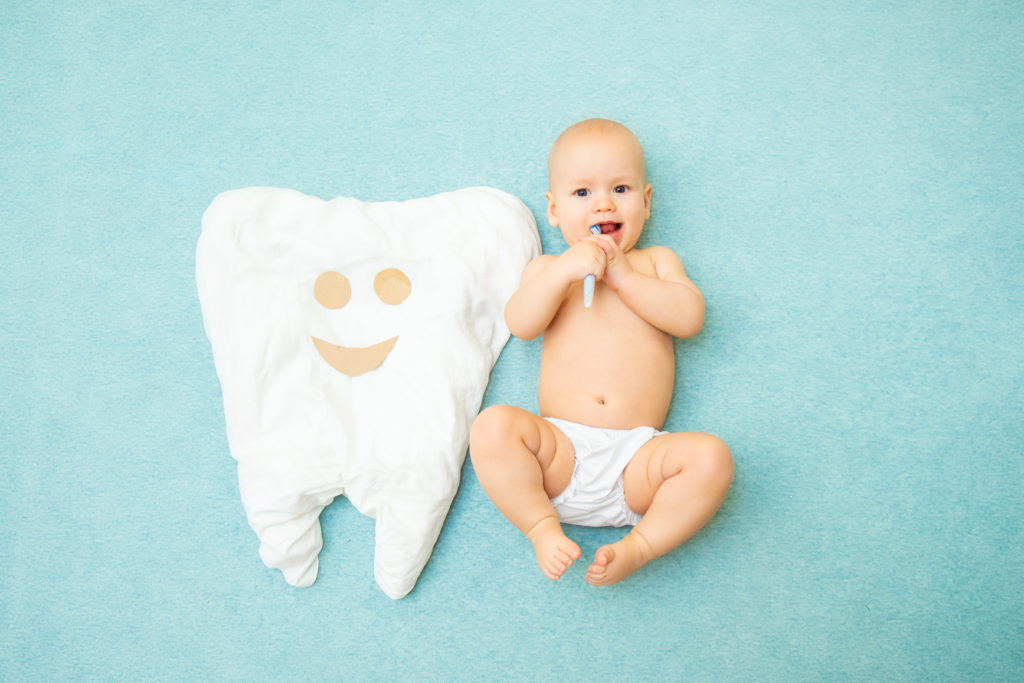Parents often have many questions about their baby's first tooth. At what age does it emerge? How can we ease the discomfort caused by teething? What should be done for baby's oral hygiene? HELVIDENT answers the questions most frequently asked by parents.
1. When does a baby's first tooth appear?
In reality, the appearance of the first tooth varies greatly from one infant to another. It is therefore difficult to predict a precise date. In most cases, a baby's first tooth emerges around the age of 6 months. This is usually the lower incisor. That said, some children still don't have a tooth when they celebrate their first birthday, while others are already born with one or two teeth. The age at which a child's teeth come through is no indication of whether he or she is advanced or retarded in other areas.
2. In what order do baby teeth emerge?
On average, baby teeth appear in the following order. We give the age as an indication only:
- 4-5 months the two lower median incisors
- 6-7 months the two upper median incisors
- 8-12 months the two upper lateral incisors
- 9-12 months the two lower lateral incisors
- 12-18 months : the first four molars
- 18-24 months the four canines
- 24 months or more the four second molars
By the age of 2-3, a child has a total of 20 milk or temporary teeth.
3. From what age should infants be given fluoride?
Fluoride strengthens enamel and helps prevent tooth decay. This essential mineral is often added to the tap water we drink. We recommend that you consult your pediatrician or dentist in Lausanne, Fribourg or Aigle for more information. It is generally advisable to give your baby fluoridated water from the age of 6 months.
4. How to soothe baby's teething troubles?
For some children, teething causes no discomfort at all, and goes virtually unnoticed. For others, on the other hand, the discomfort is perceptible, leading to crying, irritability and restlessness. When this happens, parents can soothe their baby by gently massaging the gums with a finger. You can also give your child a clean cold/ice cloth to chew on under your supervision. Don't hesitate to seek medical advice if in doubt. He'll prescribe a painkiller for painful teething.
5. What kind of dental hygiene should baby adopt before teething?
Before the first teeth appear, brushing is not necessary. Simply use a compress soaked in saline solution or water to ensure your baby's oral hygiene. To prevent the formation of bacteria in his mouth, always keep a close eye on his diet.
6. When should I start brushing my baby's teeth?
Brushing begins as soon as baby's first tooth appears, usually around 6 months of age. To avoid the formation of dental plaque, it's important to adopt good habits as early as possible. Make sure your baby's teeth are brushed once a day, preferably after a meal. To brush your toddler's teeth, stand behind him/her and hold him/her in your arms. Use baby toothpaste, as it contains the correct amount of fluoride. As for quantity, the equivalent of a grain of rice is sufficient.
7. When should I start brushing more often?
When your child reaches the age of 2, the frequency of brushing should be increased slightly. In other words, teeth should be brushed twice a day. From this age onwards, the fluoride content of the toothpaste used should be between 250 ppm and 600 ppm when the child knows how to spit. From the age of 3, a child's teeth should be brushed twice a day, but with a toothpaste slightly higher in fluoride. More precisely, the product should be fluoridated to between 500 ppm and 1000 ppm.
8. How to prevent cavities in toddlers?
In infants, tooth decay is known as "baby bottle tooth decay". It most often affects the upper incisors, but this is not an absolute rule. The main cause? Repeated, prolonged exposure of baby's teeth to milk or other liquids containing sugar. So avoid letting your child fall asleep on his or her bottle.
9. At what age should baby see a dentist?
Baby care professionals recommend that parents take their child to the dentist no later than one year of age. The best time to visit is just after the first baby tooth appears. As we explained earlier, the first tooth means the risk of tooth decay. Thereafter, you should have a check-up at least once a year.
Baby's dental care is just as important as good hygiene. oral care during pregnancy. All these factors have a direct impact on a young child's health. HELVIDENT welcomes you to its dental center in Fribourg, Aigle or Lausanne. Don't hesitate to Contact us to consult a dentist, dental hygienist or specialist in orthodontics, periodontics or dental surgery.

